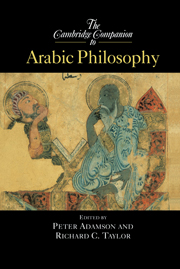Book contents
- Frontmatter
- 1 Introduction
- 2 Greek into Arabic
- 3 Al-Kindī and the reception of Greek philosophy
- 4 Al-Fāarābī and the philosophical curriculum
- 5 The Ismāīlīs
- 6 Avicenna and the Avicennian Tradition
- 7 Al-Ghazālī
- 8 Philosophy in Andalusia
- 9 Averroes
- 10 Suhrawardī and Illuminationism
- 11 Mysticism and philosophy
- 12 Logic
- 13 Ethical and political philosophy
- 14 Natural philosophy
- 15 Psychology
- 16 Metaphysics
- 17 Islamic philosophy and Jewish philosophy
- 18 Arabic into Latin
- 19 Recent trends in Arabic and Persian philosophy
- Select bibliography and further reading
- Index
10 - Suhrawardī and Illuminationism
Published online by Cambridge University Press: 28 May 2006
- Frontmatter
- 1 Introduction
- 2 Greek into Arabic
- 3 Al-Kindī and the reception of Greek philosophy
- 4 Al-Fāarābī and the philosophical curriculum
- 5 The Ismāīlīs
- 6 Avicenna and the Avicennian Tradition
- 7 Al-Ghazālī
- 8 Philosophy in Andalusia
- 9 Averroes
- 10 Suhrawardī and Illuminationism
- 11 Mysticism and philosophy
- 12 Logic
- 13 Ethical and political philosophy
- 14 Natural philosophy
- 15 Psychology
- 16 Metaphysics
- 17 Islamic philosophy and Jewish philosophy
- 18 Arabic into Latin
- 19 Recent trends in Arabic and Persian philosophy
- Select bibliography and further reading
- Index
Summary
SUHRAWARDĪ AND HIS CAREER
One is tempted to romanticize Suhrawardī. Indeed, there is no particular reason to avoid romanticizing him as a personality. He lived the life of a wandering wise man, and his story involved a prince, a magic gem, the fabulous Saladin, and a tragic early death. We can see him as his contemporaries saw him - probably as he saw himself - as a figure out of philosophical folklore, the like of whom had not been seen since Apollonius of Tyana. However, in my view it is a grave error to examine his philosophy, Illuminationism, through romantic spectacles, for Suhrawardi, despite his own attempts to mystify his project, was a hardheaded philosophical critic and creative thinker who set the agenda for later Islamic philosophy. Al-Ghazāli’s attempt to make religion independent of reason and Averroes' Aristotelianism left little trace in later Islamic thought, but Suhrawardi’s critique of Avicenna’s ontology and of Aristotelian epistemology and his solutions to these problems were his successors' starting points. The modern description of his philosophy as “theosophy” does not do justice to the rigor and philosophical influence of his thought.
Suhrawardī was probably born around 1154 in the village of Suhraward near Zanjān in northwestern Iran. We know nothing of his family or ethnic background. He first appears in Marāgha, a nearby city, where he studied logic and philosophy with Majd al-Dīn al-Jīlī, a scholar of moderate prominence who also was the teacher of the famous theologian Fakhr al-Dīn al-Rāzī.
- Type
- Chapter
- Information
- The Cambridge Companion to Arabic Philosophy , pp. 201 - 223Publisher: Cambridge University PressPrint publication year: 2004
- 2
- Cited by



